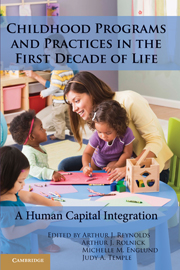Book contents
- Frontmatter
- Contents
- Contributors
- Foreword: The Essential Role of Youth Development by Robert H. Bruininks
- Acknowledgments
- 1 Early Childhood Development and Human Capital
- PART I PRENATAL AND INFANT PROGRAMS
- PART II PRESCHOOL EDUCATION
- PART III KINDERGARTEN AND EARLY SCHOOL-AGE SERVICES AND PRACTICES
- 12 Opportunity in Early Education: Improving Teacher–Child Interactions and Child Outcomes
- 13 School Readiness and the Reading Achievement Gap: Can Full-Day Kindergarten Level the Playing Field?
- 14 Small Classes in the Early Grades: One Policy, Multiple Outcomes
- PART IV ECONOMIC SYNTHESES OF EARLY CHILDHOOD INVESTMENTS
- Appendix Question-and-Answer Sessions
- Name Index
- Subject Index
- References
13 - School Readiness and the Reading Achievement Gap: Can Full-Day Kindergarten Level the Playing Field?
Published online by Cambridge University Press: 05 June 2012
- Frontmatter
- Contents
- Contributors
- Foreword: The Essential Role of Youth Development by Robert H. Bruininks
- Acknowledgments
- 1 Early Childhood Development and Human Capital
- PART I PRENATAL AND INFANT PROGRAMS
- PART II PRESCHOOL EDUCATION
- PART III KINDERGARTEN AND EARLY SCHOOL-AGE SERVICES AND PRACTICES
- 12 Opportunity in Early Education: Improving Teacher–Child Interactions and Child Outcomes
- 13 School Readiness and the Reading Achievement Gap: Can Full-Day Kindergarten Level the Playing Field?
- 14 Small Classes in the Early Grades: One Policy, Multiple Outcomes
- PART IV ECONOMIC SYNTHESES OF EARLY CHILDHOOD INVESTMENTS
- Appendix Question-and-Answer Sessions
- Name Index
- Subject Index
- References
Summary
In light of the trend toward high-stakes testing and other accountability demands, policy makers are focusing on the early childhood years as a crucial step in developing the competencies that form the basis of future academic success (Russell, 2006). In particular, there has been increased attention paid to ensuring that children enter school “ready to learn.” Although there is little consensus on the specific skills and knowledge that comprise school readiness, many educators, researchers, and policy makers adopt a broad perspective that extends beyond literacy and cognitive skills. The standards put forth by the National Education Goals Panel, for example, define five dimensions of school readiness: (a) physical well-being and motor development; (b) social and emotional development; (c) approaches to learning (e.g., curiosity, persistence, and other dispositions toward learning); (d) language development; and (e) cognition and general knowledge (Kagan, Moore, & Bredekamp, 1995).
Although the significance of early cognitive skills to school readiness is self-evident, it is also important to understand the role that nonacademic skills, such as physical and socio-emotional development, play in preparing children for school. Young children learn through physical exploration of their environments (Cassidy & Shaver, 1999; Smith & Pederson, 1988), and lags in the development of age-appropriate gross and fine motor skills (e.g., being able to run and skip or hold a pencil) can hinder their learning opportunities (Brown, 1982; Poest, Williams, Witt, & Atwood, 1990; Seefeldt, 1980).
Information
- Type
- Chapter
- Information
- Childhood Programs and Practices in the First Decade of LifeA Human Capital Integration, pp. 266 - 286Publisher: Cambridge University PressPrint publication year: 2010
References
Accessibility standard: Unknown
Why this information is here
This section outlines the accessibility features of this content - including support for screen readers, full keyboard navigation and high-contrast display options. This may not be relevant for you.Accessibility Information
- 1
- Cited by
